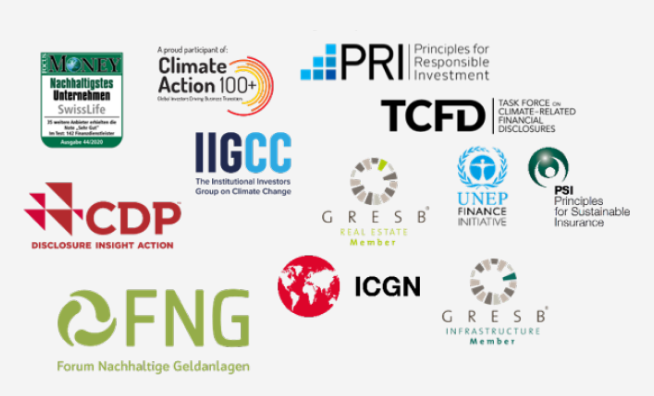In line with the Swiss Life Group sustainability strategy, Swiss Life Global Solutions is looking to ensure that its services and products create long-term value for its clients, while generating the positive impacts on people or the environment. Therefore, Swiss Life Global Solutions considers as a key topic to align its organisation with ESG-related matters by integrating sustainability aspects into all its core processes.
Sustainability as an integral part of Swiss Life Group management culture

With our advice, services and products, we enable people to lead a self-determined life and our customer relationships with private, corporate and institutional clients often last for several decades. In our business, sustainable and far-sighted management is the platform on which long-term success is built. Hence, we see corporate responsibility as an integral part of our corporate management and aim to act sustainably and responsibly in business.
Sustainability report
In this report, Swiss Life outlines its understanding of thinking and acting in a sustainable way.
Sustainability in business activities
Our commitment to business, employees, society and the environment.
Agreements and memberships


Swiss Life Group, or Swiss Life Asset Managers, is a signatory or member of the following initiatives which are inter alia setting standards and best practice relevant for responsible investing in the asset management industry.
Information on dealing with sustainability risks
Swiss Life (Luxembourg) S.A. and Swiss Life (Liechtenstein) AG, which are part of Swiss Life Global Solutions belonging to Swiss Life Group, have outsourced their capital investment and management services to Swiss Life Asset Managers. In this context, Swiss Life Asset Managers have been mandated to fulfil all the legal requirements in connection with the capital investment and management for Swiss Life Luxembourg and Liechtenstein. This includes the strategy for incorporating sustainability risks into the investment decision-making processes.
At Swiss Life Asset Managers, we consider the systematic integration of sustainability into the investment process a key success factor in building long lasting value for our clients and generating positive effects on society at large. Thereby, a sustainability risk is defined as an environmental, social or governance (ESG) event or condition that, if it occurs, could cause an actual or a potential material negative impact on the value of an investment. Such impacts may affect the assets of the financial products managed by Swiss Life Asset Managers and thus negatively impact their financial performance as well as the reputation of Swiss Life Asset Managers. We have identified a spectrum of impacts, that may be induced through ESG risks:
• Standalone impact: reduction of value and inability to meet growth/return targets
• Negative impact on other risks: e.g. asset liquidity risk or reputation risk.
Consequently, we embrace a broad set of ESG criteria throughout the entire investment process. The use of dedicated ESG indicators helps us monitoring significant social, environmental, and governance aspects of individual issuers or real assets. Climate-related metrics such as carbon intensity shall give us an indication about the carbon footprint of our portfolios, while scenario analytics such as climate value-at-risk support us in understanding the resilience of the portfolio in terms of their exposure to low-carbon transition (policy) and extreme weather events (physical).
As part of our holistic risk management approach ESG factors are integrated in our risk control processes within our asset management. The reporting of ESG assessments is a standing agenda item in our risk governance bodies. Furthermore, the continuous development of our Responsible Investment (RI) approach is steered by an overarching ESG Board that reports to Swiss Life’s Group Chief Investment Officer. The ESG Board makes recommendations and advises the Executive Committee of Swiss Life Asset Managers on ESG matters, including but not limited to sustainability risks. The Executive Committee is ultimately responsible for Swiss Life Asset Managers’ Responsible Investment approach. The local units of Swiss Life Asset Managers are responsible for local ESG strategies, its implementation, aligned and coordinated with the overarching Responsible Investment approach. Furthermore, Swiss Life Asset Managers local entities ensure that this is done in accordance with local legal and regulatory requirements and that sustainability (including but not limited to the consideration of sustainability risks) is adequately embedded in its local governance.
To address the variety of sustainability risks, our ESG approach accommodates the needs of the following asset categories:

Securities
Swiss Life Asset Managers has chosen to directly integrate ESG factors into its investment decisions. This means that ESG data and information flows directly into the analysis of investments as do traditional financial and business information. Data considered include indicators like ESG ratings and controversy flags, which help identifying companies which might be vulnerable to ESG risks, but also underlying data on polluting activities, revenue shares of critical products, industrial action, etc. to allow a more detailed analysis. This integration approach comes on top of exclusions covering companies involved in the production of controversial weapons, having a significant stake in thermal coal and other critical and sanctioned companies and issuers. To complement our analysis, we systematically engage with issuers and companies, especially when we see significant improvement potential.

Real Estate
Real estate is particularly vulnerable to climate-related risks. Whereas extreme weather events as flooding affects the value directly, low-carbon transition measures may induce indirect costs. We proactively look for effective sustainability measures and implement them across the entire real estate life cycle. Especially climate-related risks but also potential costs through demographic shifts or controversial businesses of tenants are analysed throughout all stages of the property investment cycle. Examples include considering climate risks during the purchasing process, energy-efficient renovation and repair and choosing developments suitable for the handicapped and the elderly. We also aim to increase tenants’ awareness of the need to use resources efficiently.

Infrastructure
Sustainability risks – whether climate-induced policy and physical risks or social risks such as labour safety – are material for infrastructure investments throughout their long investment horizon. Swiss Life Asset Managers has developed a robust ESG framework for assessing both direct and indirect investments in infrastructure assets. We are using dedicated ESG-questionnaires in the transaction due diligence and the ongoing monitoring of our investments. During the due diligence potential ESG risks are identified not only for our investments in renewables as wind farms or solar power plants but for all our investments as e.g. telecom and transport sector. For indirect investments via funds we strive to partner with managers who clearly demonstrate awareness of ESG factors as well as capability and willingness to actively address sustainability risks in their portfolio investments.
Swiss Life (Luxembourg) S.A. and Swiss Life (Liechtenstein) AG, in their role of financial market participants, do not consider any adverse impacts of their investment decisions on sustainability factors.
Swiss Life (Luxembourg) S.A. and Swiss Life (Liechtenstein) AG, in their role of financial advisers, do not consider any adverse impacts of investment decisions on sustainability factors in their insurance advice with regard to insurance-based investment products (IBIPs). The adverse impacts of investment decisions on sustainability factors are not being considered because of the lack of some relevant data on the underlying assets and/or its poor quality.
However, Swiss Life (Luxembourg) S.A. and Swiss Life (Liechtenstein) AG are monitoring the relevant data on an ongoing basis and envisage to proceed with the applicable disclosures as soon as they estimate that the quality of the available data significantly improves and becomes acceptable for a robust assessment of adverse impacts of investment decisions on sustainability factors.
The sustainability risks are currently not integrated in the insurance advice and the adverse impacts of investment decisions on the sustainability factors are not yet part of the insurance advice. This is due to the fact that the insurance advice only relates to the range of products offered by Swiss Life Global Solutions and does not yet include information on the sustainability risks of Swiss Life Global Solutions.
Within the framework of the remuneration system, sustainability aspects are taken into account in order to enforce the motivation of executive staff, managers and employees on the sustainability topic. This is done by agreeing on qualitative targets, which relate in particular to project, risk management or compliance requirements, as well as to leadership, sustainability and ESG (environmental, social and corporate governance) requirements. This also includes optimising diversity within the Swiss Life Group, particularly with regard to reducing sustainability risks in general. The embedding of sustainability goals and their weighting depend on the functional level within the company.
